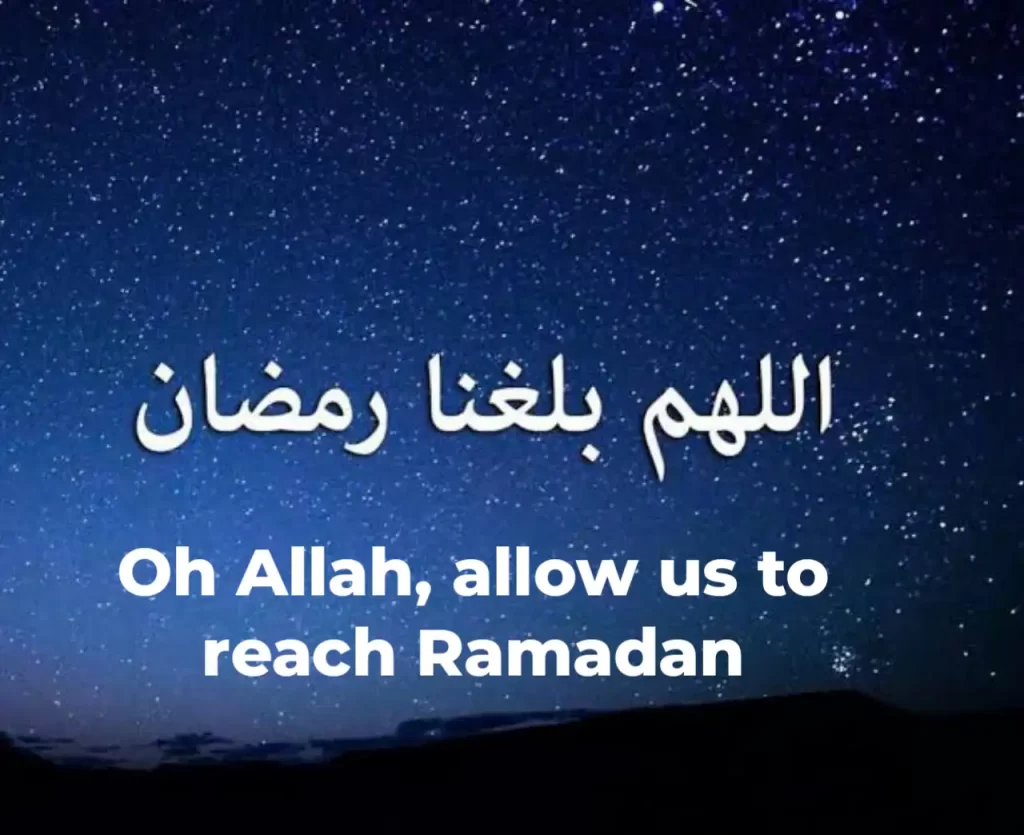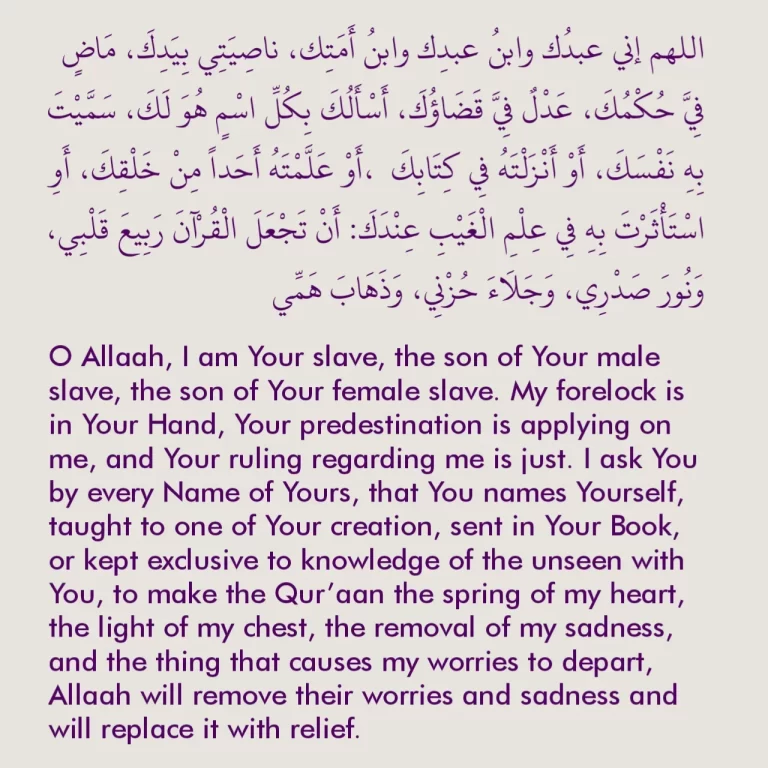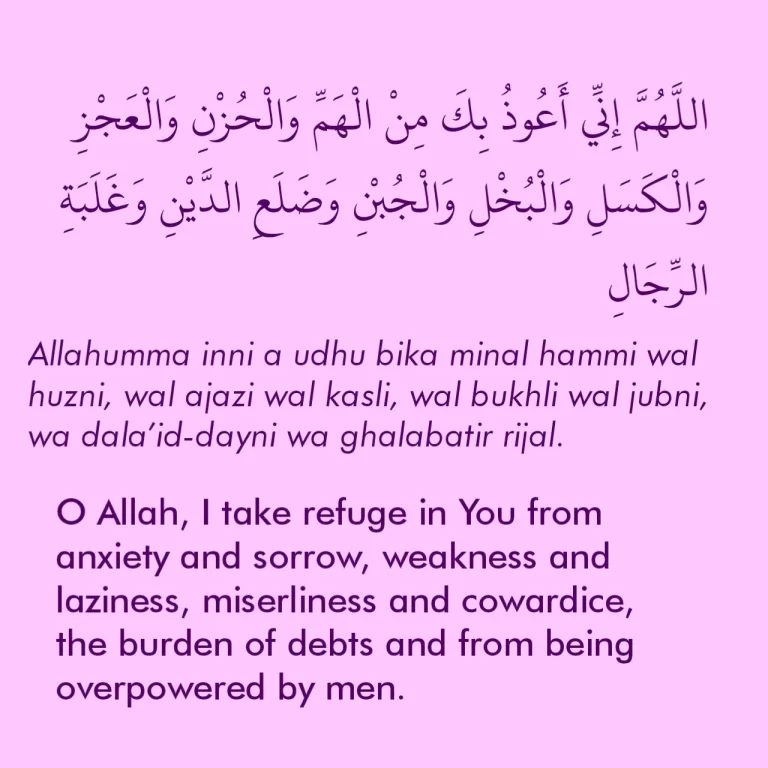Allahumma Ballighna Ramadan Meaning, Arabic, Hadith (Dua To Reach Ramadan)
Advertisements
Ramadan is a month of great spiritual significance for Muslims all over the world. It is a time for reflection, fasting, prayer, and charity. The month of Ramadan holds a special place in the hearts of Muslims, and it is an opportunity for us to come closer to Allah and deepen our connection with Him.
In this blog, we will explore the meaning of Allahumma ballighna Ramadan, the benefits of fasting, and the various acts of worship that are encouraged during this month.
Allahumma Ballighna Ramadan Meaning
The Arabic phrase “Allahumma ballighna Ramadan” translates to “Oh Allah, allow us to reach Ramadan” or Oh Allah, let us reach the month of Ramadan. This phrase expresses our sincere desire to reach this month, and it is a reminder of the blessings that come with it.
Allahumma Ballighna Ramadan in Arabic Text
Here is how to write this Islamic phrase in Arabic text:
اللَّهُمَّ بَلِّغْنَا رَمَضَانَ
Advertisements
It is a dua to reach Ramadan that asks for blessing during that month in general terms, which is valid to do in Rajab and also before Rajab.

Allahumma Ballighna Ramadan Hadith
There is no authentic hadith about the virtue of Rajab. The hadith which reads: “Allhumma barik lana fi Rajab wa Sha’ban wa ballighna Ramadan” is weak.
However, there is nothing wrong if a Muslim asks Allah to let him reach Ramadan. Check here to know the authentication of Hadith.
But the question is Can Muslims make the du’a “Allahumma Ballighna Ramadan”?
IslamQA stated there is nothing wrong wiith regard to the Muslim asking his Lord to let him reach Ramadan.
Advertisements

Al-Hafiz Ibn Rajab (may Allah have mercy on him) said:
“Ma‘alla ibn al-Fadl said: They used to pray to Allah for six months, may He be exalted, asking Him to cause them to reach Ramadan, and they used to call upon Him for six months asking Him to accept it from them.
Yahya ibn Abi Kathir said: One of their du‘as was: “O Allah, keep me safe until Ramadan, keep Ramadan safe for me, and accept it from me.””
Lataif al-Ma‘arif, p. 148

The Benefits of Fasting during Ramadan
Fasting during Ramadan is one of the Five Pillars of Islam, and it is mandatory for all adult Muslims who are physically and mentally able.
Fasting is more than just abstaining from food and drink; it is a way to purify our soul and train our willpower.
By abstaining from worldly pleasures, we learn self-discipline and become more aware of the blessings in our lives.
Additionally, fasting is a way to empathize with those who are less fortunate, and it helps us to cultivate a sense of compassion and generosity.

The fast of Ramadan is an act of worshipping Allah, the most High, by abstaining from food, drink and intimacy from dawn till sunset.
This is Fasting; one worshipping Allah by leaving these things. He does not leave them as a habit or for a body regimen, but to worship Allah by means of this.
He desists from food, drink, intimacy and other nullifiers of fast, from dawn till sunset, from the crescent of Ramadan to the crescent of Shawwal.
The fast of Ramadan is one of the pillars of Islam; this is its status in the religion of Islam. It is obligatory according to the consensus of the Muslims as indicated by the Qur’an and Sunnah.
Allah – the Most High – classified fasting to Himself whereas all other actions of the son of Adam are for the son of Adam.
Allah, the Most High said, “Every act of the son of Adam is for him, except As- Siyam (fasting) which is (exclusively) for Me.”

The meaning is that fasting is exclusive for Allah, the Exalted, among other deeds. This is because it is the greatest form of sincere worship, so it is a secret between one and one’s Lord.
This is because it cannot be known if one is fasting or not while one is moving and interacting with other people as the intention is concealed, hence it has the highest level of sincerity.
So Allah distinguished it from other deeds. Some scholars explained that it means that on the Day of Resurrection, if a person has oppressed other servants, part of his good deeds will be taken for the servants except fasting.
Nothing would be taken from it because it for Allah, the Exalted, and not for anyone else. This is a good interpretation.
The reward of fasting will be kept for its owner and nothing would be removed from it for any of the creations.

Secondly, the action of the son of Adam is rewarded in ten manifolds except fasting, the reward of which is without measure; that is, it will be in several multiples.
The people of knowledge explained that this is because fasting encompasses the three forms of patience:
- patience on obedience to Allah,
- patience to stay away from Allah’s disobedience, and
- patience on the decree of Allah.
As for patience on obedience to Allah, a person coerces his soul to fast although it may dislike it at times due to its hardship, not because Allah has made it obligatory.
If someone were to dislike fasting because Allah has instructed it, his deeds would be in vain. He dislikes it due to the accompanying hardship, nonetheless he charges his soul with it and patiently refrains from food, drink and intimacy for the sake of Allah.
Hence, Allah, the Exalted said in hadeeth Qudsi: “He leaves his food, drink and desire for My sake.”

As for patience to stay away from disobedience of Allah, this occurs to the fasting person. He patiently distances himself from vain talk, obscenity, idle talk, lie and other prohibitions of Allah.
As for patience on the decree of Allah, this is because a person would experience lethargy, boredom and thirst during fasting especially on long hot days which cause difficulty for him.
However, he remains patient because it is for the pleasure of Allah. Since it encompasses the three forms of patience, its reward is without measure because Allah, the Exalted, has said:
“Only those who are patient shall receive their reward in full, without reckoning”.
Az-Zumar: 10

Thirdly, another benefit of fasting is that a fasting person has two joyous moments. The first moment is at the time of breaking his fast, and he will be happy for two reasons:
Firstly, Allah has blessed him to complete one of His obligations. How many are those who hope to fast for a day but could not because they are now in their graves.
But Allah has blessed him with this fast, so he fasted and this is a blessing. How many people started a fast but could not complete it.
So when he breaks his fast, he is happy because he has performed one of the obligations of Allah.
The second source of happiness is that Allah has permitted for him what conforms to his natural state such as food, drink and intimacy after he was forbidden from it.
These are two causes of happiness at the time of breaking the fast: Allah has blessed him with the completion of this obligation and Allah has blessed him by making permissible for him what is beloved to him such as food, drink and intimacy.

Fourthly, another benefit in this hadeeth- referring to the benefits of fasting and to the wisdom behind the obligation of fasting, the Prophet SAW said,
“When anyone of you is observing fast, he should neither indulge in obscene language nor should he raise his voice.”
He should not utter a sinful word nor should he raise his voice and talk loudly, but remain calm, courteous and gracious.
If anyone abuses him or insults him, he does not shout at him; rather, he would say, ‘I am fasting.’
He says this in order to prevent his abuser from subjugating him. It is as if he is saying, ‘I am not incapable of standing up to you but I am fasting.
My fasting prevented me from replying you’. Hence, he should say it loudly. Similarly, if he says “I am fasting”, it will restrain him from confronting his abuser.
It is as if he is saying to himself, “I am fasting, so I must not reply the one who has abused me.” This is also a decent and profound meaning.
Acts of Worship during Ramadan
Ramadan is a time for increased worship, and there are several acts of worship that are encouraged during this month. These include:
Tarawih: Taraweeh is a special form of nighttime prayer that is performed during Ramadan. It is an opportunity to spend time in extra prayer and recitation of the Quran.
Quran Recitation: Ramadan is an excellent time to increase our recitation of the Quran, and to strive to understand its teachings.
Charity: sadaqa, or giving to charity, is another important act of worship during Ramadan. By giving to those in need, we purify our wealth and demonstrate our compassion and generosity.
Summary
In conclusion, Ramadan is a month of great spiritual significance, and it is an opportunity for us to come closer to Allah and deepen our connection with Him.
By fasting, performing extra acts of worship, and giving to those in need, we can make the most of this sacred time and reap the blessings that come with it.
May Allah allow us to reach Ramadan, and may He bless us with its blessings and mercy. Amen.
Advertisements







